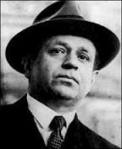We writers in the Weltbühne are accused of just always being against everything, and that we have nothing positive to offer, that we only reject and criticise, and even that we dirty our own German doorstep. And, what’s worse, that we fight hate with hate, violence with violence, and the fist with the fist.
It’s really the same small group of people who write this magazine, and it is worth emphasizing how close our ranks are, even though we don’t know each other well. Some issues give the impression of being the result of a long editorial conference, but the editor actually took the decisions on his own. So the accusation that we are just negative is directed against intellectually independent authors, who do not influence each other directly. But are we really just negative? Are we really? Let’s open the drawers of our German chest, and see what’s inside.
The revolution. If revolution just means collapse, then it was one; but there is no reason to expect the ruins to be any different from the building that stood. We lost and we were hungry, and those responsible for it ran away. And the people were left there: their old flag had been torn down, but they had no new one.
The bourgeoisie. This is, although it has often been misunderstood, a moral category, one is bourgeois by inclination, not by birth, and certainly not by profession. The German bourgeoisie is antidemocratic through and through. There is probably nothing comparable in any other country, and that is the heart of the whole problem. It is not true that they were oppressed before the war, it was their deepest wish to gaze upwards with loyal doggy eyes, to let themselves be kicked into line, and to feel the strong hand of their divine protector! Now it’s gone, and they shiver with loss. Censorship has fallen away, but they still faithfully repeat the old slogans, babbling fearfully, as though nothing had happened. They recognize no middle path between patriarchal rule and a Bolshevism which has degenerated into robbery, because they are not free. They accept everything as long as they are allowed to make money. And we’re supposed to be positive about them?
The officers. We have demonstrated here why, and to what extent, the German officer class failed in the war, and the offences it committed against its soldiers. It was not the class itself, attacks against collectivities are always unjust, it is about the bad spirit that imbued the class, and was influential far into the bourgeois class. The lieutenant and his, for want of a better word, mental world, were a German ideal, and the Reserve officer didn’t need long to grow into his uniform. It was the infernal lust to be able to kick the person next to you without being penalized; it was the German lust to seem more important in service than you are in private life, the pleasure of posing in front of the wife or girlfriend, and below that a person squirms. I do not deny that officers, in a certain sense, fulfilled their duty, and passed on some of this sense to many under their command, but they often did so only after they had already greedily taken more than they were entitled to. The young gentlemen whose hand I was able to see during the war, weren’t particularly impressive, but I’m not concerned with individuals, and how are things ever going to get better if we don’t say it now? Now, because there will be no point later; now, because later, when the new army has been established, it would be a waste of time to go back over the faults of the previous regime. And we have got to make it clear to the Germans that it must not happen again, and not just to some of them, because it was not just the sins of certain reactionary circles: everyone, absolutely everyone, took part enthusiastically. The problem of the soldiers, the same as the problem of all ‘subordinates’ in Germany, was not a question of political conviction, it was a lack of culture. The lowest instincts of a bourgeois were set free as soon as the state put them in command. They were not worthy of it. And we’re supposed to be positive about them?
The civil service. What do you think of an administration in which the official is more important than the measure he takes, and the measure taken is more important than the issue in question? How the apparatus creaked and spread itself out so impressively! What a stretching out of departments and positions! What bliss when someone could make a ruling! He was put down by all the other departments, and there were lots of them, but now it was his turn! And the issue itself drowned in regulations and decrees. The petty cliques and rivalries in the agencies filled people’s lives, and the tax-payer was defenceless against his own creation. And we’re supposed to be positive about that?
The politicians. You can define politics in this country as the imposition of economic aims with the help of the legislature. Politics was for us a question of endurance, not intellect. It was spluttered and gasped in local associations, and all the others closed ranks against the workers. The spirit in which proposals and laws arose, and the convictions which were both the motivation and the driving force, and which made the aims understandable, were forgotten. Old school diplomats were discredited, the people said that they didn’t have the modern spirit; now it was the turn of the businessmen. But they haven’t got the modern spirit either. The importance of the economy was wildly exaggerated. Aristocrats and traders fought each other for influence over the state, which they should really share, under the leadership of the intellectuals. And we’re supposed to be positive about that?
We’re not surprised by the opposition of the bourgeoisie, to whom politics just gets in the way of business. We are more surprised by that of the intellectuals. What is the point of intellectual knowledge if you don’t sometimes come down from the mental heights, apply your results to daily life, and try to form it to fit your ideals? Nothing is more shameful and hated than applied intellect. You can do anything: make the most dangerous abstract demands, carry out literary revolutions, dethrone God, but don’t try to influence the tax laws. They are extremely sensitive, and have the most reliable instinct for anything which can get in the way of business, their mistrust is endless, their resentment cannot be overcome. They can smell whether your love or hate is good for their shop, and if it isn’t, God help you!
It is a battle of wills. No result, no aim in this world is achieved by logical argumentation. The conclusion is arrived out by feeling, and is always clear from the start, the arguments follow, as an excuse, an intellectual parlour game. Nobody ever convinced anyone with reasons. It’s a battle of the wills: all people of good will have the same aims, what people fight us for is not the fight itself, it’s the tactics.
But how are we supposed to fight short-sighted, narrow-minded idiots, and peasants who are as hard as nails, other than with cudgels? That has been the greatest problem of this country for centuries: people believed that they could overcome power with superior intellect. If we, who have looked behind the scene, and are convinced that the world as it is cannot be the final aim of mankind, if we don’t find an agent to impose our intellectual conclusions, we are damned to live in subjugation to butcher’s boys for ever, and they will let us keep the books and ink and paper to express our irrelevant ideas. It is absolutely fruitless to believe that you can avoid tearing existing things down before you can construct something new. Let’s get specific. A speech by Naumann in Weimar doesn’t oblige anyone to anything: the resolution agreed by some municipal council shows the naked bourgeois.
The unconditional solidarity of the intellectuals must confront the unconditional solidarity of the money-makers. We can’t keep presenting to the smug bourgeoisie the spectacle of a struggle which to them only poses the questions, can we keep on wheeling and dealing or not? Can we keep on making deals in our cliques or not? That’s all they hear, no metaphysical truth, no critical philosophical error.
Have we already forgotten what happened? Are we already slipping back into the cozy rut in which keeping quiet is the citizen’s first and last duty? You can already hear the worn out phrase, »It can’t have been that bad« all over the place. »Your husband died of pneumonia?« said the man. »It can’t have been that bad!«
It was that bad. And don’t try and tell us again that the pioneering work of the German businessmen will get us out of it. We have disgraced ourselves throughout the world because we hid our best forces deep inside the country and sent our inferior ones out into the world. But voices are already being raised that want to convince the Germans that everything will be all right if we just deliver cheap goods. That’s not what we want. We don’t want to be of use because our young men undercut everyone else abroad, and because we toiled but didn’t work. We want to be respected for who we are.
And to be respected in the world we have first got to thoroughly clean out at home. Are we dirtying our own doorstep? You can’t dirty Augean stables, and it would be absurd to stand on the broken roof of an old barn and sing the national anthem.
They say we should make positive proposals. But positive proposals are no use until the country is honest with itself. The reforms we’re talking about cannot be carried out by regulation, or by new national agencies from which everyone hopes to have their particular interests served. We don’t believe that it is enough to build up a big card index and a large staff and then specialize your efforts in one area. We believe that the essential things in life are behind the things, and that a decent attitude can deal with even the worst regulation. Without a decent attitude there’s no chance.
What we need is this decent attitude.
We can’t yet be affirmative. We can’t support an attitude which forgets humanity for the sake of the humans. We can’t encourage a people to only do its duty when every worker has his own concept of honour, which only gets in the way of doing what he’s supposed to do. We cannot affirm a people that still makes you fear the worst, had we happened to have won the war. We cannot affirm a country that is obsessed by collectivities, and for which the corporation stands far above the individual. Collectivities are only there to support individuals. We cannot affirm those whose fruit the young generation is: an indifferent and lifeless species, infected with the childish hunger for domestic power and international indifference, more attracted to bars than bravery, of ineffable disdain for any sturm and drang, which are not in at the moment; with no flame, no dash, no hate and no love. You want us to run, but our legs are bound. We can’t yet be affirmative.
People who have no sympathy for aims which go beyond the immediate issues, in this country we call them realists, oppose us because we don’t think that compromise will save us, and because we don’t think that new symbols or new documents will save us. We are well aware that ideals are not entirely realizable, but we are equally aware that nothing happens, or is achieved or changed, entirely without ideals. And, our opponents see this as a danger, and they are right to do so, we don’t believe that ideals should just shine decoratively in the starry sky, they must burn down here on earth, in the bug-infested corners of the cellars, and above the roofs of the palaces of the rich, in the churches, where the old miracles are being rationally betrayed, in the dens of the money-changers, which they have made into a temple.
We can’t yet be affirmative. We know that we have got to clean up what was, and is, rotten in Germany, now, today, with an iron broom. It’s no good sticking our heads in a black, white and red flag and fearfully whispering, “Later, friends, later! Don’t make a fuss now”. Now!
It’s ridiculous to accuse a movement which is only four months old that it has not yet matched the achievements of a three-hundred-year-old tradition. We know that.
We are confronted by a Germany incredibly full of corruption, full of cheats and informers, full of three times a hundred thousand devils, each of which one claims exemption from the revolution for their black soul. But we mean him, exactly and only him!
And we can choose: are we going to fight it with love, or with hate? We want to fight with hate born out of love. With hate against all those who had the audacity to drink the blood of their compatriots like one drinks wine, to drink to their health and the health of their friends. With hate against a clique to whom excessive property, and the corresponding misery of the home workers, seem to be the will of God, which bribes professors to prove that it has to be this way, and which lives a bucolic idyll on the bent backs of a vegetating people. It’s true, we fight with hate. But we also fight with love for the oppressed, who are not always the proletariat, and we love the thought of humanity in the people.
Destructive? For four and a half years we heard the terrible affirmation that declared that everything was right that brazen arrogance chose to command. How sweet the world was! Everything worked, everyone agreed, everyone d’accord, one heart and one soul. How the artificially arranged landscape with its uniformed puppets moved in praise of our master! It was Anacreon’s theme. And that which man thought to be strong as iron collapsed with a thunderous roar. And that which was not even wrought iron, the generals, started to justify themselves, although they didn’t need to, it was nobody’s fault, and the revolutionaries, who came too late and were stopped too soon, were accused of having caused the disaster, which had really been coming for generations.
Destructive? Blood and suffering and wounds and trampled-on humanity, it should all at least not have been for nothing. Lets keep saying no when it needs saying! That is Aeschylus’ theme.
Published in:





